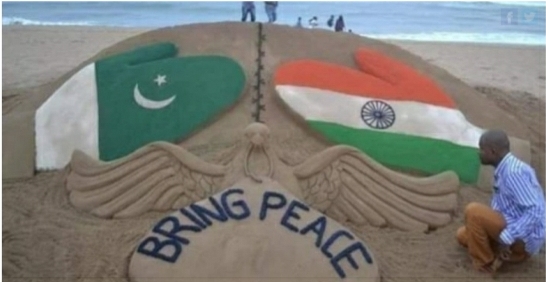by Noman Hossain, Freelance Journalist (nomanhossain123@protonmail.com)

Pakistan Army Chief Qamar Javed Bajwa has made an appeal for peaceful resolution on long-pending issues with India saying “it is time to bury the past and move forward”.
The development must be music to years of people longing for peace in South Asia. Now, it would be interesting to see how India responds since similar attempts in the past could not yield positive result. Rather, the Pakistani appeal may make New Delhi concerned and suspicious about Pakistan’s real intent as offer of reconciliations had followed by terror attacks or even a war in the past.
Delivering a speech at the Islamabad Security Dialogue, Bajwa said the stable Indo-Pak relation was a key to unlock the untapped potential of South and Central Asia, which however has forever remained hostage to disputes and issues between two countries. In the same breath, Bajwa also sought India to create “conducive environment”, particularly in Indian- Administered Kashmir. This particular tone may irk India since Pakistan has always been alleged to have promoted militancy and violence in the region.
India has always charged Pakistan of backstabbing. In early 1999, the then Indian Prime Minister Atal Bihari Vajpayee made a historic visit to Pakistan and signed a famous Lahore Declaration with his Pakistani counterpart Nawaz Sharif. The declaration underlined ‘sharing a vision of peace and stability’, ‘durable peace and development of harmonious relations and friendly cooperation’, ‘mutually agreed confidence building measures for improving the security environment’, among others. However, within six months, Pakistan Army intruded India and occupied winter-vacated posts of Indian Army.
Despite the Kargil episode, Indian leadership showed statesmanship and invited military general cum new ruler of Pakistan Parvez Musharraf to India in 2001. The much-touted Agra summit failed to yield positive results but it was followed by a terror attack on Indian Parliament by Pakistan-based terrorists. The perpetrators belonged to Lashkar-e-Taiba and Jaish-e-Mohammed terror outfits, which are still active in Pakistan. In 2015, the current Indian Prime Minister Narendra Modi made a surprise visit to Pakistan to greet his Pakistani counterpart Nawaz Sharif on his birthday, despite severe chill in the bilateral relations.
India’s attempts to create positive vibes, conducive environment for peace in the region was sabotaged in just a week. An Indian Air Force base at Pathankot in Punjab was attacked by Pakistan-based terrorists — reviving the painful memories of 2001 Parliament attack.
Indian blamed Pakistan to have played active role in almost every terror attack in India. The 2008 Mumbai attack, 2019 Pulwama attack are some of such attacks that have caused anti- Pakistan sentiments to grow in India. Indian government has asserted that Pakistan establishment has never taken a concrete action against the terror groups despite handing over required and adequate evidences. In 2019, Modi too expressed his concerns saying Indian got “betrayal” from Pakistan whenever a hand of friendship was extended. “I invited Pakistan’s PM for oath-taking ceremony in 2014. We had extended a hand of friendship towards Pakistan. I visited Lahore, but we got betrayal,” he said.
Recently, current Pakistani Prime Minister Imran Khan said India would have to take the first step for resumption of ties. He spoke about the reduction in violation of ceasefires at the international border. Both countries had signed ceasefire agreement in 2003. Barring initial few years, the agreement was hardly followed with both countries blaming each other for the ceasefire violations.
